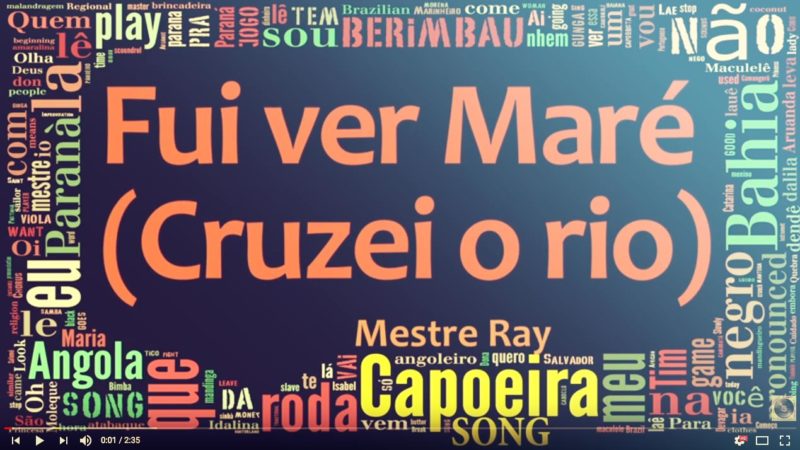Mestre Toni Vargas – “Noite Sem Lua”
Written by Mestre Toni Vargas :
Master Toni by himself:
“I lived in Engenho de Dentro, a suburb of Rio. There, I had a group of very special friends: we were more than friends, we were brethren of capoeira and binged on the rodas of life. There, I lived my most spontaneous encounters with capoeira, the youthful side, the vagrancy, the training on earth, without a Master, without anything. The pleasure of singing and playing berimbau at will (at that time to play in a roda, you had to be good), the pleasure of discovering in capoeira an exit to our poverty, to the conflicts of adolescence, to inaugurate a style of living. My friends were black and so was I. I was “Black Power.” My dance was black, my girlfriends were black and what I loved the most – capoeira – was black.
I entered capoeira at age 10, with Mestre Rony, from the Palmares Group of Capoeira, in a neighborhood in the Northern Zone of Rio de Janeiro. It was the chance of my life. Unfortunately, he’s gone. And his end was that of misery, madness and pain as, incidentally, that of many who helped Capoeira and could not have a worthy end. I believe that it is the responsibility of all the capoeiristas to fight so that, nowadays, this does not happen anymore.
In the mid 70’s, I began to practice capoeira in the Penha neighborhood, suburb of Rio de Janeiro, with Mestre Touro – Corda Bamba Group. He was my second master. In the Corda Bamba group, I had the opportunity to meet great masters. And, certainly, to drink the axé of Master Taurus, was fundamental in my history of capoeira.
With Master Leopoldina I did not have the honor of training, but I consider myself a little of his student. The master is one of those who, standing next to you, is already teaching you. I, whenever I could, stayed there “learning by being by his side”. In fact, it used to be like this, there was no systematic teaching of capoeira, there were no methods and no teaching. It was to follow the master, to be attentive, and to try to turn it into something of his own. Master Leopoldina, when he sings, plays or plays, he teaches. When he tells his incredible stories, he teaches. When you smile or welcomed us to his home, he teaches. In short, the teacher does not have to teach to teach: he is the teaching itself. ”
——
“Morei no Engenho de Dentro, subúrbio do Rio. Lá, eu tinha um grupo de amigos muito especiais: nós éramos mais que amigos, éramos irmãos de capoeira e de farra nas rodas da vida. Ali, eu vivi meus encontros mais espontâneos com a capoeira, o lado moleque, a vadiação, o treino na terra, sem mestre, sem nada. O prazer de cantar e tocar berimbau à vontade (naquela época para tocar em uma roda tinha que ser bamba), o prazer de descobrir na capoeira uma saída para a nossa pobreza, para os conflitos da adolescência, para inaugurar um estilo de viver. Meus amigos eram negros e eu também. Eu era “Black Power”. Minha dança era negra, minhas namoradas eram negras e o que eu mais amava – a capoeira – era negra.
Entrei na capoeira aos 10 anos, com Mestre Rony, do Grupo Palmares de Capoeira, em um bairro da Zona Norte do Rio de Janeiro. Foi a chance da minha vida. Infelizmente, ele já se foi. E seu final foi de miséria, loucura e dor como, aliás, o de muitos que ajudaram a capoeira e não puderam ter um final digno. Creio que seja responsabilidade de todos os capoeiristas lutarmos para que, hoje em dia, isso não mais aconteça.
Nos meados dos anos 70, passei a praticar capoeira no bairro da Penha, subúrbio do Rio de Janeiro, com Mestre Touro – Grupo Corda Bamba. Ele foi meu segundo mestre. No grupo Corda Bamba, eu tive a oportunidade de conhecer grandes mestres. E, certamente, beber o axé de Mestre Touro, foi fundamental na minha história de capoeira.
Com o mestre Leopoldina eu não tive a honra de treinar, mas considero-me um pouco seu aluno. O mestre é daqueles que, parado ao seu lado, já está te ensinando. Eu, sempre que posso, fico ali “aprendendo de estar do lado”. Aliás, antigamente era assim, não havia um ensino sistemático da capoeira, não havia métodos e nem didáticas. Era seguir o mestre, ficar atento, e procurar transformar aquilo em alguma coisa sua. O mestre Leopoldina quando canta, toca ou joga, ensina. Quando conta suas incríveis histórias, ensina. Quando sorri ou nos recebe em sua casa, ensina. Enfim, o mestre não precisa dar aulas para ensinar: ele é o próprio ensinamento.”
—–
|
Era uma noite sem lua, Era uma noite sem lua, Era uma noite sem lua Era uma noite sem lua e eu tava sozinho (refrão) (refrão) (refrão) (refrão) (refrão) |
It was a moonless night, It was a moonless night, It was a moonless night. It was a moonless night and I was alone. (chorus) (chorus) (chorus) (chorus) (chorus) |




